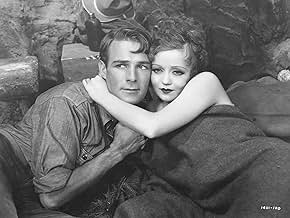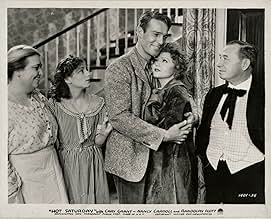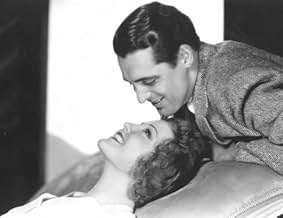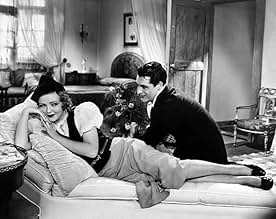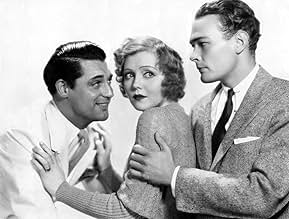NOTE IMDb
6,5/10
1,5 k
MA NOTE
Ajouter une intrigue dans votre langueA pretty but virtuous small-town bank clerk is the victim of a vicious rumor from an unsuccessful suitor that she spent the night with a notorious womanizer.A pretty but virtuous small-town bank clerk is the victim of a vicious rumor from an unsuccessful suitor that she spent the night with a notorious womanizer.A pretty but virtuous small-town bank clerk is the victim of a vicious rumor from an unsuccessful suitor that she spent the night with a notorious womanizer.
- Réalisation
- Scénario
- Casting principal
Lilian Bond
- Eva Randolph
- (as Lillian Bond)
Nora Cecil
- Gossip on Telephone
- (non crédité)
Billy Engle
- Third Bank Customer
- (non crédité)
Kenner G. Kemp
- Party Guest
- (non crédité)
Marjorie Main
- Gossip in Window
- (non crédité)
Dave O'Brien
- Party Guest
- (non crédité)
Avis à la une
Newcomer Cary Grant was paired with Paramount star Nancy Carroll in Hot Saturday, a film which is most dated, but still packs quite a punch. Nancy Carroll's stardom was beginning to slip while Cary as we know was fast on the rise.
Hot Saturday however is about gossip, something that will eternally be with us. But happy to say some people's attitudes have definitely changed for the better. Nancy Carroll would not be fired today from her job at a bank because of her private life.
Carroll's a popular girl with all the young men of her town, but she's engaged to stalwart Randolph Scott who's a promising young engineer. One of her fellow co-workers at the bank Edward Wood tries to put the moves on her, but she won't give him a tumble. It's he who starts a nasty rumor about Carroll and the town playboy Cary Grant who is guilty of nothing more than offering her a ride home in his car after she ran off from Woods.
Depending on where you are from malicious gossip will probably not have the effect it does on Nancy Carroll. Still it can damage one. Years ago in a former place of work and we're talking now about the 1970s I recall in my office there was a section known as the 'poison pond'. It was where a few women who had nothing else to do but gossip about everything and everyone else around. No escaped their malicious tongues and something like what happens to Nancy Carroll would have been grist for that mill for a month.
Thank God people have a more live and let live attitude, but gossip is still a perennial problem and Hot Saturday deals nicely with it.
Hot Saturday however is about gossip, something that will eternally be with us. But happy to say some people's attitudes have definitely changed for the better. Nancy Carroll would not be fired today from her job at a bank because of her private life.
Carroll's a popular girl with all the young men of her town, but she's engaged to stalwart Randolph Scott who's a promising young engineer. One of her fellow co-workers at the bank Edward Wood tries to put the moves on her, but she won't give him a tumble. It's he who starts a nasty rumor about Carroll and the town playboy Cary Grant who is guilty of nothing more than offering her a ride home in his car after she ran off from Woods.
Depending on where you are from malicious gossip will probably not have the effect it does on Nancy Carroll. Still it can damage one. Years ago in a former place of work and we're talking now about the 1970s I recall in my office there was a section known as the 'poison pond'. It was where a few women who had nothing else to do but gossip about everything and everyone else around. No escaped their malicious tongues and something like what happens to Nancy Carroll would have been grist for that mill for a month.
Thank God people have a more live and let live attitude, but gossip is still a perennial problem and Hot Saturday deals nicely with it.
"Hot Saturday" is a terrific little movie, and much better than its IMDb rating would suggest.
This was my first exposure to Nancy Carroll, and it's clear from her performance and screen presence why she was such a major star, if only for a short time. She plays a young woman living in a small town who becomes the subject of rumors when she's seen cavorting with a known rascal, played by Cary Grant, who likewise proves why he rocketed to stardom and stayed there. When Carroll realizes the small-minded people of the town are going to treat her like a floozy whether or not any of the rumors are true, she decides to make them true by giving the town (and Grant) what they want. This happens much to the dismay of her solid, down-to-earth beau, played by Randolph Scott.
I was not expecting this film to end the way it did, and was thrilled at the way it completely defied my expectations. Carroll doesn't see the error of her ways, apologize to her mom and dad and hunker down to a nice, sensible marriage with Scott. Instead, she hops in a car, essentially gives the entire town the finger, and rides off with Grant. Take that, Production Code!!
It was so refreshing to see a film that allows a woman her sexuality without forcing her to apologize for it by the film's end. Sure, she's going to be branded a slut by the town she's leaving behind, but the movie makes the town and the people in it so miserable that the viewer doesn't care any more for its opinion than Carroll does herself.
"Hot Saturday" is on a double DVD bill with "Torch Singer," and the two films together make a dynamite duo.
Grade: A-
This was my first exposure to Nancy Carroll, and it's clear from her performance and screen presence why she was such a major star, if only for a short time. She plays a young woman living in a small town who becomes the subject of rumors when she's seen cavorting with a known rascal, played by Cary Grant, who likewise proves why he rocketed to stardom and stayed there. When Carroll realizes the small-minded people of the town are going to treat her like a floozy whether or not any of the rumors are true, she decides to make them true by giving the town (and Grant) what they want. This happens much to the dismay of her solid, down-to-earth beau, played by Randolph Scott.
I was not expecting this film to end the way it did, and was thrilled at the way it completely defied my expectations. Carroll doesn't see the error of her ways, apologize to her mom and dad and hunker down to a nice, sensible marriage with Scott. Instead, she hops in a car, essentially gives the entire town the finger, and rides off with Grant. Take that, Production Code!!
It was so refreshing to see a film that allows a woman her sexuality without forcing her to apologize for it by the film's end. Sure, she's going to be branded a slut by the town she's leaving behind, but the movie makes the town and the people in it so miserable that the viewer doesn't care any more for its opinion than Carroll does herself.
"Hot Saturday" is on a double DVD bill with "Torch Singer," and the two films together make a dynamite duo.
Grade: A-
Hot Saturday (1932)
There are a few early Cary Grant movies where he has a small role, or where he isn't quite the "Cary Grant" we have come to expect (and which he always jokingly said he wanted to become himself). But this one is pure, true Grant, and very early, indeed. But even better, the plot, the mise-en-scene (including town scenes, domestic situations, and a range of outdoor stuff at the lake including a bohemian roadhouse on the water), and the photography are amazing. I mean amazing. There are a few stumbles in the acting, but you get so swept along, and so continually surprised, this won't matter much at all.
The director of all this gets a huge amount of credit, because William Seiter who pulls the best out of the cast and the crew, equally--and who presumably helped choose some terrific location shots as well as matching studio scenes. Seiter was a Hollywood working man director, doing lesser A-list films and making them decent, though none that I've seen (a small fraction of a huge output from the 20s to the 40s) has the energy and flair of this one. And this is an unsung one, definitely worth seeking out.
Likewise, Arthur Todd behind the camera did a dumpload of good if unamazing films, and so it was with the music and set design. But the leading lady is another story. Nancy Carroll really steals the show, even from Grant and the other leading male, the rather wooden and handsome Randolph Scott. She has a kind of live-wire, doll-face quality a little similar to Claudette Colbert, easily as amazing in this film. Carroll supposedly had more fan mail than any actress in this era of Hollywood, and was contracted with Paramount (which was the studio here). But she was so difficult to work with offscreen (rejecting many parts) they let her go, and her career slid, and she probably missed out on another higher kind of stardom.
But here she is alive, sympathetic, and complex on screen. If Cary Grant isn't enough to lure you in, give Carroll her due.
This is of course a pre-code film (widely advertised as such) and in fact the looseness of the events, the morality of the lead, and the suggestive scenes (never explicit) all help make this come alive. The dance and party scenes are so much fun you'll wish you were there, and the cave in the storm as well as the night scenes in the woods are pretty amazing, too. The end will prove, again, both the ability of pre-code films to touch on real life issues, and the need of even these kinds of films to have a moral compass by the end. The very last few seconds takes care of this.
Great stuff. A huge surprise for me.
There are a few early Cary Grant movies where he has a small role, or where he isn't quite the "Cary Grant" we have come to expect (and which he always jokingly said he wanted to become himself). But this one is pure, true Grant, and very early, indeed. But even better, the plot, the mise-en-scene (including town scenes, domestic situations, and a range of outdoor stuff at the lake including a bohemian roadhouse on the water), and the photography are amazing. I mean amazing. There are a few stumbles in the acting, but you get so swept along, and so continually surprised, this won't matter much at all.
The director of all this gets a huge amount of credit, because William Seiter who pulls the best out of the cast and the crew, equally--and who presumably helped choose some terrific location shots as well as matching studio scenes. Seiter was a Hollywood working man director, doing lesser A-list films and making them decent, though none that I've seen (a small fraction of a huge output from the 20s to the 40s) has the energy and flair of this one. And this is an unsung one, definitely worth seeking out.
Likewise, Arthur Todd behind the camera did a dumpload of good if unamazing films, and so it was with the music and set design. But the leading lady is another story. Nancy Carroll really steals the show, even from Grant and the other leading male, the rather wooden and handsome Randolph Scott. She has a kind of live-wire, doll-face quality a little similar to Claudette Colbert, easily as amazing in this film. Carroll supposedly had more fan mail than any actress in this era of Hollywood, and was contracted with Paramount (which was the studio here). But she was so difficult to work with offscreen (rejecting many parts) they let her go, and her career slid, and she probably missed out on another higher kind of stardom.
But here she is alive, sympathetic, and complex on screen. If Cary Grant isn't enough to lure you in, give Carroll her due.
This is of course a pre-code film (widely advertised as such) and in fact the looseness of the events, the morality of the lead, and the suggestive scenes (never explicit) all help make this come alive. The dance and party scenes are so much fun you'll wish you were there, and the cave in the storm as well as the night scenes in the woods are pretty amazing, too. The end will prove, again, both the ability of pre-code films to touch on real life issues, and the need of even these kinds of films to have a moral compass by the end. The very last few seconds takes care of this.
Great stuff. A huge surprise for me.
Ruth (Nancy Carroll) is a bank clerk in a small town where the only diversion for young adults is a dance hall named Willow Springs outside of town. Ruth is pursued by a number of young men, including a wealthy playboy, Romer Sheffield (Cary Grant). She is very successful at keeping them all at arm's length, though she occasionally enjoys tempting them.
After Ruth returns home later than usual, the town's rumor mill--spurred by rival Eva--has a heyday. With her reputation ruined, Ruth makes some choices that are life-altering.
The music that accompanies the opening credits might lead the viewer to expect a madcap comedy. It is nothing of the sort. It is a scathing depiction of small-town society. However, the ending--which is, if nothing else, confusing--suggests that the film is (also) a cautionary tale. Whichever way you interpret it, this film is very interesting.
The acting is good. Nancy Carroll shines. Cary Grant and Randolph Scott are strong in their roles.
After Ruth returns home later than usual, the town's rumor mill--spurred by rival Eva--has a heyday. With her reputation ruined, Ruth makes some choices that are life-altering.
The music that accompanies the opening credits might lead the viewer to expect a madcap comedy. It is nothing of the sort. It is a scathing depiction of small-town society. However, the ending--which is, if nothing else, confusing--suggests that the film is (also) a cautionary tale. Whichever way you interpret it, this film is very interesting.
The acting is good. Nancy Carroll shines. Cary Grant and Randolph Scott are strong in their roles.
In small-town Marysville, attractive bank clerk Nancy Carroll (as Ruth Brock) is desired by several young men. She prefers to play the field. One of Ms. Carroll's more ardent admirers is wealthy playboy Cary Grant (as Romer Sheffield). He invites Ms. Carroll and her friends over to his lakeside estate for alcohol and fun, on a "Hot Saturday" night in July. Carroll arrives, on a date with co-worker Edward Woods (as Connie Billop). She refuses to make-out with him during a boat ride, so he dumps her ashore. That's not very gentlemanly. Carroll walks to Mr. Grant's house and he sends her home in his chauffeured car. Jealous banker's daughter Lilian Bond (as Eva Randolph) sees Carroll sneaking in late and spreads the rumor that Carroll spent the night with Grant. Carroll's reputation is ruined...
Soon, girl-shy geologist Randolph Scott (William "Bill" Fadden) returns to town, after seven years. A childhood friend, Mr. Scott discovers Carroll has grown out of her pigtails and into a bra. Carroll sees quick marriage as a solution to her problems. "Hot Saturday" is about malicious gossip, which has turned out to be a timeless problem. It's interesting to see it play out in the 1930s. Director William Seiter and the Paramount studio crew really go to town on "Marysville". The automobiles and fashions gleam. There are almost too many people in early background scenes; probably, everyone ran errands on Saturday. Watch for a scene occurring at just under 15 minutes of running time; in it, Carroll wrestles her squealing teenage sister Rose Coughlan (as Annie) to remove some stolen under-shorts.
****** Hot Saturday (10/28/32) William Seiter ~ Nancy Carroll, Cary Grant, Randolph Scott, Edward Woods
Soon, girl-shy geologist Randolph Scott (William "Bill" Fadden) returns to town, after seven years. A childhood friend, Mr. Scott discovers Carroll has grown out of her pigtails and into a bra. Carroll sees quick marriage as a solution to her problems. "Hot Saturday" is about malicious gossip, which has turned out to be a timeless problem. It's interesting to see it play out in the 1930s. Director William Seiter and the Paramount studio crew really go to town on "Marysville". The automobiles and fashions gleam. There are almost too many people in early background scenes; probably, everyone ran errands on Saturday. Watch for a scene occurring at just under 15 minutes of running time; in it, Carroll wrestles her squealing teenage sister Rose Coughlan (as Annie) to remove some stolen under-shorts.
****** Hot Saturday (10/28/32) William Seiter ~ Nancy Carroll, Cary Grant, Randolph Scott, Edward Woods
Le saviez-vous
- AnecdotesThis was Cary Grant's first role as a leading man.
- GaffesWhen Conny Billop signs his name in Ruth's date planner, he spells it "Connie", but in the credits the character's name is listed as Conny.
- Citations
Ruth Brock: Is Listerine good for brains?
Romer Sheffield: Love they tell me is better.
- Crédits fous(Opening titles) Marysville boasted of one bank, two fire engines, four street cars, and a busy telephone exchange. Everyone knew on Sunday what everyone else did on Saturday... and the rest of the week.
- ConnexionsFeatured in L'univers du rire (1982)
- Bandes originalesIsn't It Romantic?
(uncredited)
Written by Richard Rodgers and Lorenz Hart
Heard on soundtrack when Carroll arrives at Grant's house.
Meilleurs choix
Connectez-vous pour évaluer et suivre la liste de favoris afin de recevoir des recommandations personnalisées
- How long is Hot Saturday?Alimenté par Alexa
Détails
- Durée1 heure 13 minutes
- Couleur
- Rapport de forme
- 1.37 : 1
Contribuer à cette page
Suggérer une modification ou ajouter du contenu manquant

Lacune principale
By what name was Hot Saturday (1932) officially released in India in English?
Répondre
